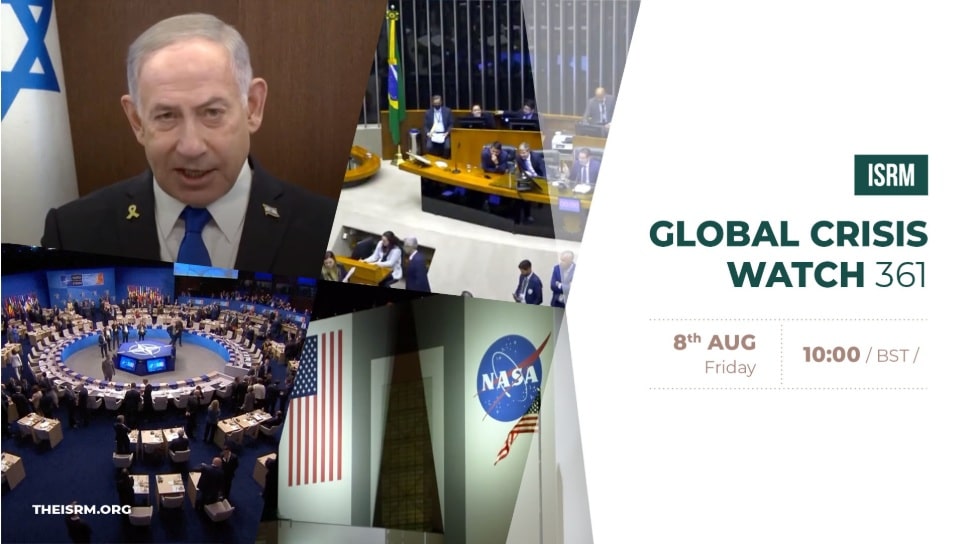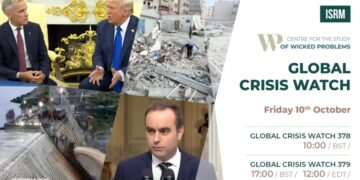The Institute of Strategic Risk Management (ISRM), has announced its latest Global Crisis Watch, number 361, taking place Friday, August 8 at 10:00 BST.
The highlighted topics this week will include, Netanyahu pushing for full Gaza reoccupation as ex-generals, allies and protesters call for ceasefire, Nordic nations pledging $500 million to NATO-led effort sending us weapons to Ukraine, a controversial Brazil bill which could undermine indigenous rights and accelerate deforestation, and NASA’s nuclear moon plans sparking debate over safety, strategy and global competition.
Netanyahu pushes full Gaza reoccupation as ex-generals, allies and protesters call for ceasefire
Israeli Prime Minister Benjamin Netanyahu is expected to propose the full military reoccupation of the Gaza Strip, according to Israeli media. This follows the breakdown of ceasefire talks and the release of harrowing videos of Israeli hostages. A senior official was quoted as saying, “The die has been cast”, with Netanyahu reportedly planning to “defeat Hamas” by occupying all of Gaza – despite concerns from military leaders and hostage families who fear for the remaining captives.
Critics warn the move may be political, with polls showing most Israelis favour a ceasefire deal. Some suggest the announcement is aimed at pressuring Hamas. The Israeli military claims control over 75% of Gaza, but new operations may target central refugee areas, risking further civilian harm. Nearly 90% of Gaza’s 2.1 million people have been displaced, and UN agencies warn famine is already occurring. Israel has permitted limited private-sector aid into Gaza, but efforts have been compromised by looting and deadly accidents, including one where overturned aid trucks killed 20 people.
Meanwhile, about 600 retired Israeli security officials – including ex-heads of Mossad and Shin Bet – have written to US President Donald Trump urging him to pressure Netanyahu to end the war, claiming military objectives have been met and the campaign is now unjust. Critics argue further warfare only fuels Hamas’s ideology.
Internationally, pressure on Israel is growing. France, the UK and Canada have announced conditional recognition plans for a Palestinian state. The Palestinian Authority has denounced Netanyahu’s proposal, while some Israeli far-right ministers openly advocate annexing Gaza and building settlements – raising fears of permanent occupation.
In Australia, 90,000 people marched across Sydney Harbour Bridge demanding a ceasefire in what organisers called a historic protest. The Supreme Court authorised the demonstration just hours before it began, despite police objections. Protesters, including public figures, condemned the humanitarian crisis and accused the Australian government of inaction.
The war, launched after Hamas’s 7th October attack, has so far killed around 1,200 Israelis and more than 60,000 Palestinians, according to Gaza’s health authorities. With starvation, displacement and diplomatic backlash mounting, Israel faces intensifying scrutiny over its future course in Gaza.
Nordic nations pledge $500 million to NATO-led effort sending us weapons to Ukraine
Sweden, Norway and Denmark have jointly pledged approximately $500 million to a NATO-led initiative aimed at supplying US-made weapons to Ukraine, including Patriot missile systems and other air defence equipment. This coordinated effort is part of the newly launched NATO Prioritised Ukraine Requirements List (PURL), which seeks to accelerate Ukraine’s access to essential military aid and bolster its ability to defend against ongoing Russian attacks.
The funding follows a recent statement by US President Donald Trump indicating that the US would supply weapons to Ukraine with costs covered by European allies, though without providing operational details. The Nordic countries are now among the first to implement this plan. Denmark will contribute $90 million, Norway $146 million and Sweden $275 million.
Norwegian Defence Minister Tore O. Sandvik emphasized the urgency of the effort, stating that the move would both strengthen NATO cooperation and ensure peace on Ukraine’s terms. Danish Defence Minister Troels Lund Poulsen echoed the urgency, noting that the funding would be made available immediately, with potential for further support.
Ukrainian President Volodymyr Zelensky welcomed the support, calling it a foundation for long- term European security and a strong model for transatlantic defence cooperation. He said the initiative sends a clear message to Moscow: “Russia will never turn Europe into a continent of war”.
Sweden’s Deputy Prime Minister Ebba Busch stressed that American defence systems such as Patriots are critical to Ukraine’s defence, as European stockpiles are insufficient to meet demand.
NATO Secretary General Mark Rutte thanked the Nordic countries for their leadership and rapid response. The Netherlands had already committed €500 million the previous day, becoming the first contributor to the fund. The PURL initiative is expected to expand further, with NATO coordinating contributions from other European members and Canada.
The initiative marks a significant step in transatlantic defence cooperation and could serve as a model for future European-led military support efforts, reinforcing NATO unity in the face of prolonged Russian aggression.
Controversial Brazil bill could undermine indigenous rights and accelerate deforestation
A new environmental licensing law in Brazil, awaiting presidential approval, has sparked concern from United Nations experts and environmental groups, who warn it could accelerate deforestation in the Amazon and undermine human rights.
The proposed legislation aims to streamline environmental approvals for infrastructure projects – such as roads, dams, mining and energy development – by reducing bureaucratic hurdles. Some smaller-scale projects could bypass full environmental assessments through self-declared impact forms. Critics argue that these changes would enable developers to proceed without adequate oversight, increasing the risk of environmental degradation.
UN Special Rapporteur Astrid Puentes Riaño called the bill a “rollback for decades” of environmental and human rights protections. She expressed particular concern over the Amazon, warning that the relaxed rules could apply to mining projects and allow deforestation without proper environmental impact evaluations. The law would also allow automatic renewal of existing project licenses and potentially grant automatic approvals if agencies miss set deadlines—raising fears that essential assessments may be bypassed entirely.
Riaño emphasized that while efficiency is important, assessments must be scientifically grounded and inclusive. The legislation would also weaken consultation requirements with indigenous and Quilombola communities, potentially violating their rights and Brazil’s constitutional guarantee to a balanced environment.
The proposal has been dubbed the “devastation bill” by critics, including Brazil’s Climate Observatory, which called it the worst environmental rollback since the military dictatorship era. Environment Minister Marina Silva condemned it as a “death blow” to protections, but faces political challenges within the government and from Brazil’s conservative-dominated Congress.
Supporters of the bill argue that it would boost economic development, including renewable energy and infrastructure expansion, by reducing delays and uncertainties for businesses. However, analysts say it may open the door to legal challenges due to potential conflicts with constitutional environmental rights.
President Lula da Silva has until August 8 to approve or veto the law. Even if vetoed, Congress could override the decision—raising the stakes as Brazil prepares to host COP30, the global climate summit, later this year.
NASA’s nuclear moon plans spark debate over safety, strategy and global competition
NASA has announced plans to fast-track the deployment of a nuclear reactor on the Moon by 2030, part of a broader US strategy to establish a permanent human presence on the lunar surface and counter similar ambitions by China and Russia. Acting NASA Administrator Sean Duffy, appointed by President Trump, directed the agency to accelerate development to maintain US leadership in space amid growing geopolitical competition.
The proposed reactor would supply at least 100 kilowatts of power – sufficient for long-term lunar operations. Although the idea is not new, this directive marks NASA’s most assertive push yet. In 2022, NASA awarded three $5 million contracts to companies to design such a system. Meanwhile, China and Russia have announced plans to install a nuclear-powered lunar base by 2035.
Experts argue that nuclear energy is vital for sustaining lunar missions. The Moon experiences two-week cycles of darkness, making solar power unreliable for long-term habitats. Dr Sungwoo Lim of the University of Surrey called nuclear power “inevitable”, while other scientists stress that megawatt-scale systems will be needed to support human crews.
However, there are challenges. Safety concerns surround launching radioactive material into space, and NASA’s Artemis 3 mission – meant to return humans to the Moon in 2027 – faces delays and funding cuts, including a proposed 24% budget reduction. Critics say the reactor plans are not well-aligned with the broader mission timeline.
Some scientists have raised alarms over the political motivations behind the move, fearing a return to Cold War-style space competition. Duffy warned that rival powers could declare “keep-out zones” around lunar installations, effectively restricting access. This touches on the controversial interpretation of the Artemis Accords, which call for “safety zones” but not territorial claims.
In a parallel move, Duffy also called for accelerated plans to develop commercial replacements for the aging International Space Station, expected to retire by 2030.
As the space race intensifies, questions remain about the feasibility, timing and coordination of US ambitions – especially as global interest in lunar settlements grows.
These stories will be highlighted, plus other topics that are catching our attention wherever we live in the world. Feel free to join and add your voice to the conversation.
To register, click here
For more ISRM news, click here





